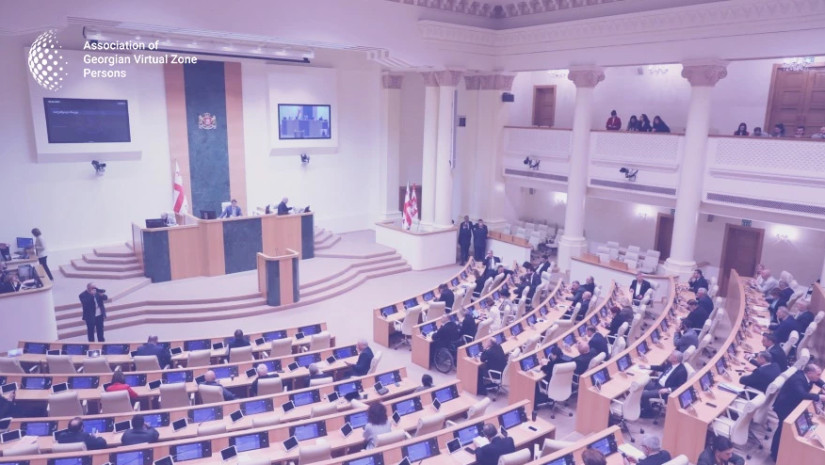Tbilisi (GBC) - In recent years, the approaches observed during the tax audit of Virtual Zone Persons (VZPs) by the Revenue Service of the Ministry of Finance have shown that the legislation regulating taxation for VZPs that entered Georgia from 2011 due to the "tax oasis" is too ambiguous.
The legislation contains gross inconsistencies and loopholes, and because of this, instead of tax benefits, international IT companies entering the market receive millions of GEL fines.
According to Shorena Kopaleishvili, Chairman of the Association of Georgian Virtual Zone Persons, the fact that the Revenue Service checked almost all companies with the status of VZP, as a result of which many companies were fined for incorrectly declaring taxes (the basic tax was charged, a fine, and penalty amounts).
A minefield of tax legislation
In the opinion the Association and its partners, the presence of only this last fact would certainly not be a sign of any special alarm signal, if there were not some essential circumstances:
The first issue is that due to the ambiguity of the legislation, the Revenue Service fined many companies not based on the current legislation but on the so-called methodical guidelines developed by GRS for entirely different reasons.
Second, after a large number of companies were fined, the Revenue Service changed its approach several times (issued several methodological references), according to which it became clear that, according to the revised methodological references issued after fining the entrepreneurs examined at the first stage, companies were no longer subject to taxation and fines for the same issues. As a result, the companies included in the first wave of inspections were fined. This revealed the fact that many companies were wrongly penalized.
As the third issue, the chairman of the Association, a highly qualified lawyer with many years of experience, names the fact that in a short period of time (about a year and a half), the Revenue Service issued three methodological references radically different from each other. The approaches of the Revenue Service changed at least three times on the principal issues of VZP taxation, which again indicates that the Revenue Service itself was not fully formed on many details of the tax treatment of the VZP.
In addition, many issues related to VZP taxation are still ambiguous and unregulated, and there is an extremely high probability that after a few years, the events will develop exactly in the same scenario as they did in the last three years. In other words, there is an extremely high probability that companies will be fined again for some new basis and reason, which is still ambiguously spelled out in the methodological references describing the approaches of the Revenue Service. Subsequently, as a result of the change of approaches, it may become clear that the approaches applied to the companies fined at the first stage were incorrect.
Undoubtedly controversial cases
In recent years, the Revenue Service has been arguing with VZP companies on the following issues:
1. According to the initial approach of the Revenue Service, VZP's information technologies were not considered to be produced in Georgia, and the profit tax benefit was canceled if the creation of the product by VZP was not essentially done through persons hired in Georgia. Lastly, the Revenue Service, at the first stage of the inspections, considered that if a high percentage of so-called programmers (80%, 90%, 100%) were not hired in Georgia, the company would not be entitled to a profit tax benefit. On this basis, many companies were fined, after which methodological references were issued, which revealed that at the first stage, the amounts were charged incorrectly to the fined companies (currently, the methodical references state that the participation of one hired, one service provider, or one resident founder in the creation of the program is sufficient for IT to consider the product as produced in Georgia).
2. Due to the fact that the VZP tax benefit was established only in the profit tax part and the VZP did not benefit in the income tax part, many companies were fined by the Revenue Service for reclassifying the amounts given as dividends as wages and taxing them with income tax. The Revenue Service used different approaches at different times and considered the dividends issued by VZP as paid wages and taxed them with income tax, in some cases with an amount corresponding to 40% of the income and sometimes with an amount of up to 5000 GEL per person, which was later considered the wrong approach according to the methodological references issued by the Revenue Service. As a result, after fining many companies, the Revenue Service itself admitted that the approaches it used in the initial stage of reclassifying dividends as wages were incorrect.
3. The companies were fined in the profit tax section only for the reason that the provisions of the international agreement on avoidance of double taxation were applied when the companies paid an amount to a non-resident and this amount was not taxed at the source of payment. Due to the latter, the Revenue Service, in relation to a number of companies, considered that the use of international agreements for the avoidance of double taxation in relation to the amounts of services paid to a non-resident, in the part of taxes withheld at the source of payment, is the basis for canceling the benefit established for the VZP in the profit tax, which is clearly a misinterpretation of the existing legislation and is due to the ambiguous and vague provisions of the legislation regulating the taxation of VZP companies.
4. VZP companies were fined for many other unjustified reasons, after which in some cases it became clear from the methodological references issued later by the Revenue Service that charging money from the payers on this basis was inconsistent with the current law, and regarding some issues, the vagueness and ambiguity of the law have not been eliminated to this day, nor has the methodological reference developed by the Revenue Service.
Tax experts talk about another big problem of the taxation of VZP: the taxation of persons with the specified status should be regulated not at the level of methodological guidelines that reflect the approaches of the GRS (which is not a normative act), but at the level of the current tax legislation in Georgia, which provides for amendments and additions to the tax legislation of Georgia (in particular to the Tax Code), the Law of Georgia “On Information Technology Zones” and the Decree of the Government of Georgia No. 49
In addition, it should be noted that the last (third) methodological reference of the Revenue Service still does not explain and regulate many issues of taxation of private enterprises, which prevents the development of the mentioned sector in Georgia.
"Despite the numerous problems that have existed and exist in the field of VZP taxation, and despite the fact that, as mentioned above, hundreds (if not thousands) of companies were wrongly fined by the Revenue Service, it can be said that VZP companies, are hopeful for the future, continue to successfully operate in Georgia and make a great contribution to the development of the country's economy, as well as to the introduction of new technologies in our country and the transformation of our country into an information technology hub" - explained in Association.
According to them, despite the numerous problems and challenges that were not fully mentioned above, VZP companies made a great contribution to the development of our country in all directions, namely:
1. The amount of taxes paid by VZP companies in Georgia in 2011-2022 is more than 70 million GEL.
2. Hundreds of Georgian citizens are employed in VZP companies.
3. More than 1,000 companies have been granted the status of the VZP. Among them are world-renowned and industry-leading companies, whose entry into Georgia was accompanied by the inflow of vast experience and knowledge in this field, as well as the influx of multimillion-dollar investments into our country, which gives an additional impetus to the development of Georgia.
Based on the above, the Association team believes that the regulatory legislation in such a promising field for the development of Georgia should be clearly formulated and spelled out in the relevant legislative acts and should not allow for misinterpretation by the Revenue Service. All the details of the taxation of companies with the status of VZP should be spelled out in the Tax Code of Georgia and in the regulatory legislation of the mentioned field, not in the methodological references of the Revenue Service or the so-called situational manuals, which have no legitimacy. In addition, as the practice has shown, the Revenue Service itself is inclined to change its approaches to important and principled issues of VZP taxation and to wrongly penalize many companies in conditions where these issues are not properly regulated by the current law.
That is why it is necessary to make changes and additions to such legislative acts as:
1. The Tax Code of Georgia
2. Law of Georgia on Information Technology Zones
3. Normative acts regulate the field of VZP.
The essence and expected results of the project of legislative changes
The authors of the proposed amendments to the law are sure that a number of problematic issues will be settled with the legislative amendments.
According to them, by adopting the package of changes, the definition of information technology will be clarified, and it will also be clarified that the types of activities of VZP are determined by the government of Georgia.
Also, according to the updated legislation, the definition of information technology produced in Georgia is introduced, after which the issue of considering the information technology product as produced in Georgia by VZP will no longer be disputed. This will eliminate the vicious practice of the Revenue Service regarding the use of different approaches by different companies in the same situation, and it will be much easier to use the benefits established in the profit tax by VZP companies.
According to the authors of the draft of the legislative initiative, according to the package of changes, after Article 25 of the Tax Code, Article 25 Prima is added, which will regulate many urgent issues of taxation for VZP, namely:
1. It is emphasized that the issue of granting tax benefits by the VZP is regulated only by the provisions of the Tax Code.
2. A direct reference is made to the fact that the VZP can engage in other activities along with the production of information technology products, which does not lead to the cancellation of its status.
3. It is emphasized that the use of the profit tax benefit by the VZP does not depend on the use of other benefits defined by the international agreement for the avoidance of double taxation or the Tax Code of Georgia.
4. When the sums paid by VZP are considered dividends, the same amounts will no longer be considered as wage amounts and taxed with income tax in accordance with the market wage rate (40% of income, market wage rate, 5000 GEL, etc.), even if the tax benefit of VZP companies is used in the profit tax.
5. When carrying out taxable and exempted activities, the rule for calculating the amounts of exempted profits is established (in proportion to the exempted income in total income).
6. It is also emphasized that according to Article 99 of the Tax Code, only the supply of information technology products produced in Georgia is exempt from profit tax, and the latter is defined by Article 8 of the Tax Code.
7. The Law of Georgia on Information Technology Zones is in compliance with the Tax Code of Georgia.
So, the fate of developing and activating this most important sector of the economy properly, without surprises, will be decided by the voting buttons of the deputies.






















